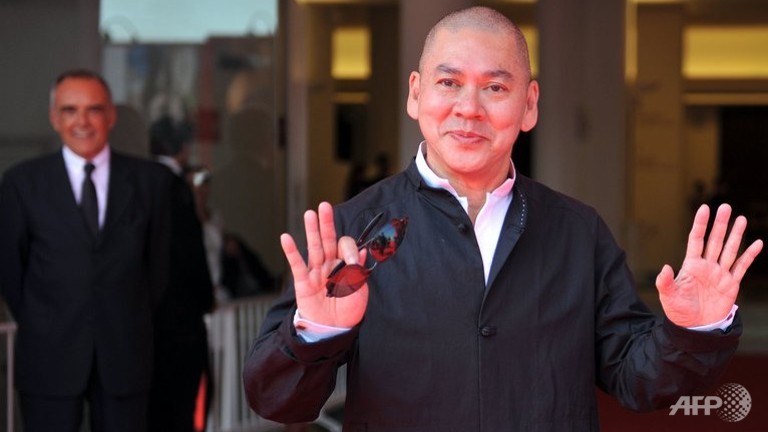Tsai Ming-Liang strips life to basics in hypnotic film

Taiwanese director Tsai Ming-liang poses as he arrives for the screening of "Jiaoyou" (Stray Dogs) presented in competition at the 70th Venice Film Festival at Venice Lido. (AFP/Tiziana Fabi)
VENICE - Taipei-based director Tsai Ming-liang lived up to his reputation as the master of "Slow" cinema in Venice on Thursday with "Stray Dogs", the poetic tale of a homeless family on the margins of society.
"This is not a film about hope or despair. It's about a man who gives up, who lets himself go completely," Malaysian-born Tsai told AFP in an interview in a leafy courtyard.
"Everywhere we look, unemployment is increasing, homelessness is rising. Life is becoming more difficult for many, and it is those difficulties I wanted to explore," he said.
In the film, a father - played by actor Lee Kang-sheng, a regular in Tsai's feature films - scrapes out a meagre living as a human billboard for luxury apartments in Taipei, while his teenage son and young daughter live off supermarket food samples.
The three come together again at the end of each repetitive day to eat, wash and sleep.
With extremely long takes and the minimalist dialogue characteristic of "Slow" cinema, "Stray Dogs" explores the toll life on the streets takes on a father who can offer his children little more than basic shelter in an abandoned house and washing facilities in a public bathroom.
"Life in my work is like a mirror, one you look in but fail to see your reflection. It's about desiring things, but never being able to attain them," Tsai said.
Among fleeting scenes capturing simple delights - such as the boy's attempt to amuse his sister by dressing up her prized cabbage - the film explores basic needs in depth, lingering extensively on images of urinating or eating.
The result is a collage of hypnotic shots bordering on the obsessive.
"In the world I have created, everything stems from an understanding of things as time passes. I have to let things rest and be digested," Tsai earlier told journalists in Venice where his film is in competition for the Golden Lion.
"I feel at a loss when I am faced with the speed modern life imposes on us. I feel being slow is a technique to find one's way in the confusion," said Tsai, whose film "Vive L'Amour" - another example of slow cinema - won the Lion in 1994.
The director, who confirmed "Stray Dogs" would likely be his last film, brushed aside suggestions that the work may not be appreciated by general audiences.
"I see little other than commercial films nowadays in the cinema. People might learn to appreciate slowness," he said.
"There are directors who try to make films which will change the world, but who are we hoping to influence in a world where speed prevails?" he said.
Lee said he had done little acting in the movie but drew on his real life experiences - and found that making the film had given him tools to face future challenges.
"Shooting a movie with Tsai is extremely hard, everyone from the cast will agree. Collaborating with him is like a torture you have to bear," he said.
"I experienced the heaviness of life with him, and performing the role has prepared me in some way for the future," he added.
Lee and Tsai joked about the challenges of preparing for one of the most powerful scenes in the film, which he had to get right on the first take.
"The screenplay just said 'Lee eats the cabbage'. I didn't know how to play it, I kept wondering how I was going to eat the cabbage - in the end I ate it raw - and whether the cabbage was supposed to represent my life," Lee said.
"I knew it stood for something important, so I just let my emotions flow."
What the stars mean:
★ Poor ★ ★ Promising ★★★ Good ★★★★ Very good ★★★★★ Exceptional
Latest News
More News
- Vietjet launches mega year-end ticket promotion (December 10, 2025 | 11:33)
- Vietjet launches daily Manila flights to celebrate year-end festive peak season (December 05, 2025 | 13:47)
- Phu Tho emerges as northern Vietnam’s new tourism hub (December 01, 2025 | 17:00)
- Vietjet completes Airbus A320/A321 updates ahead of deadline (December 01, 2025 | 09:49)
- Vietjet resumes Con Dao flights from early December (November 28, 2025 | 15:24)
- Free tickets, Lunar New Year promotions on offer at Vietjet Mega Livestream (November 26, 2025 | 15:32)
- UNIQLO unveils upgraded heat-retention wear at Hanoi event (October 26, 2025 | 10:00)
- Vietnam named among world’s top four culinary destinations (October 24, 2025 | 17:09)
- Vietnam and Denmark strengthen dialogue on sustainable fashion (October 20, 2025 | 09:11)
- Fusion rolls out special initiatives to celebrate Vietnamese Women’s Day (October 17, 2025 | 20:00)
















 Mobile Version
Mobile Version